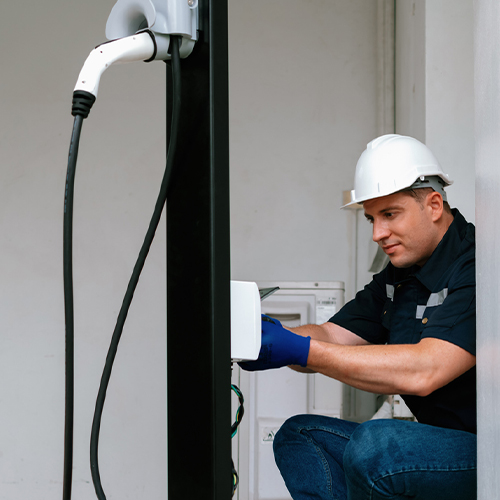Charging Stations Crafted for Homes & Businesses
Common Questions About EV Charging Station Installation
Choosing the best charger depends on several factors, including your daily energy consumption, vehicle type, and space availability.
For homes, Level 2 chargers are ideal as they deliver faster charging without needing significant infrastructural changes. For businesses, larger setups like DC fast chargers or multiple Level 2 stations might be better suited.
Rhema Electric’s team assesses your property’s electrical capacity to recommend the charger that seamlessly meets your needs.
Our EV charger installation services begin with a detailed inspection of your electrical panel to ensure it can handle the additional load. We handle all necessary permitting, panel upgrades, install wiring, and test the system for performance and safety. Whether you’re upgrading your energy solutions at home or installing chargers at a business, we make the process hassle-free from start to finish.
Yes, many local and federal incentives exist to offset the cost of EV charger installations for homes and businesses. From rebates to tax credits, numerous programs have been created to support the shift toward cleaner energy.
Our team can help guide you through the eligibility requirements and point you toward opportunities that maximize your savings.
Home EV chargers are built for long-term reliability and require very little upkeep. We recommend occasionally inspecting the cable for signs of wear and checking that indicator lights are working as expected.
If your charger is in a garage or outdoors, keep it clean and free of dust, moisture, or debris. Most Level 2 units we install include built-in safety features like auto shutoffs and temperature sensors to reduce manual maintenance. We only recommend models backed by solid manufacturer warranties, typically 3 to 5 years, for dependable performance over time.
Yes, charging an electric vehicle at home will add to your overall electricity use, but it’s typically more affordable than using public charging stations. The amount of increase depends on your driving habits and how frequently you charge. For example, charging a fully depleted 60 kWh battery once a week could raise your monthly bill by around $50, depending on local rates.
Many homeowners lower charging costs by setting the charger to run overnight during off-peak hours, when utility rates are lower. Smart chargers and certain utility programs also let you schedule charging times or receive credits for energy-efficient usage.

